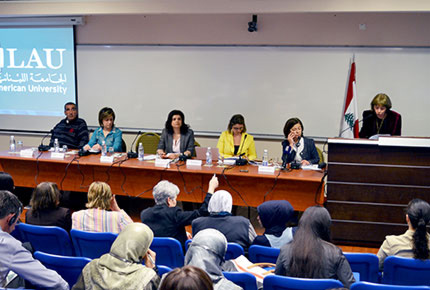The wives of the missing, suffering in silence
A new report launched at the Beirut campus this week details the impact of disappearance on the wives of the missing.

A new report launched at the Beirut campus this week details the impact of disappearance on the wives of those who went missing during the civil war.
“When you think of these women, you see them holding photos of their loved ones at a sit-in, but you don’t think of their lives and their struggles,” said Christella Yakinthou of a report she authored as part of a collaboration between LAU, its Institute for Women’s Studies in the Arab World (IWSAW) and The International Center for Transitional Justice (ICTJ). The report was launched yesterday on the Beirut campus.
The product of two years’ work, the report is titled “Living with the Shadows of the Past” and describes the impact of disappearances on the wives of the missing in Lebanon. The launch showcased a six-person panel that presented data, research and personal testimonies about the families of the over 17,000 people who went missing during Lebanon’s civil war. “We, the wives, are close knit now, and I will be as happy for any one of them to have their husband come home as I would for myself,” said panel member Rabiaa Riachi, one of 23 wives interviewed for the report.
“We mustn’t forget that eight percent of the missing are women,” said Ghazi Aad, director of the organization Support for Lebanese in Detention and Exile. “But certainly the wives of the 92 percent, the over 16,000 men who were kidnapped and whose fate remains unknown four decades after the start of the war, those women have struggled a lot and continue to suffer,”
The panel also included Widad Halwani, president of the Committee of the Families of the Kidnapped and Missing. “It is our right to know,” said Halwani, echoing the slogan of the committee, which was founded in 1982 as the civil war raged on and more and more men where being kidnapped in front of their families or from their homes, often at gun point. “The state has done nothing in support of our right to know. This is not only the right of the families of the missing, it is the right of all Lebanese to know the history of their country, the fate of their citizens.”
However, according to Yakinthou, women who demand that the history books be opened often face a society that wants to forget the war for fear that opening old wounds may lead to a return to insecurity. “It is a very hostile environment for them, in so many respects,” she said. “They have alone taken on the burden of looking for the missing. They have faced extortion by liars promising information or the safe return of their loved ones. And if they don’t relent and declare their husbands dead, they lose all access to their assets.”
Soon after a government committee concluded in 2000 that all the missing must be presumed dead, 54 were released from Syrian prisons and more from Israel. Others have since been released, as recently as 2012, adding to the hope and suffering of the wives and families of the thousands who remain missing and whose government has perpetually neglected to conduct a thorough inquiry into their fates.
More
Latest Stories
- Into the Psychology of Justice
- Alumnus Zak Kassas on Navigation, Spoofing and the Future of GPS
- Hearing Between the Lines
- LAU Hematology Conference 2025: Advancing Science Through Interdisciplinary Exchange
- Dr. Chaouki T. Abdallah Invested as LAU’s 10th President
- LAU Guides Its Students Through the Code of Conduct
- Innovative Procedure at LAU Medical Center–Rizk Hospital Signals Hope for a Patient With a Congenital Disease
- LAU’s Inaugural PodChat Session Addresses AI Detection in the Classroom

